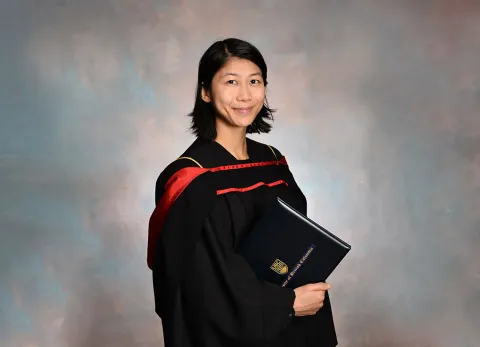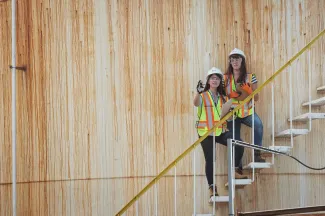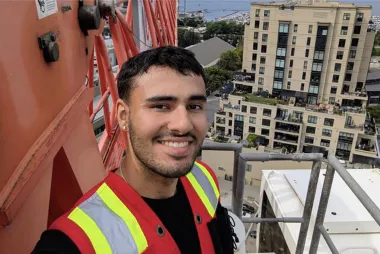"Our ultimate objective in learning about anything is to try to create and develop a more just society." - Yuri Kochiyama

Aleesha Hsu
- Degree:
- Bachelor of Applied Science
- Grad year: 2021
- Program:
- Campus: Vancouver
I graduated early from high school, moved to Kimberley, BC on my own and worked as a full-time ski instructor for a season. The following fall, I started university with no real idea of what I wanted to major in. I started taking courses on international human rights, global poverty, literacy, and urban community planning while working at a local ski hill and playing club soccer as much as I could. It took me a year and a half of undergrad to figure out I wanted to study engineering. This realization put me on a path that would eventually lead me back to my hometown to graduate from UBC Engineering.
UBC Engineering was a great community to jump into, but it was by no means perfect. For years now, climate change mitigation and (gender/racial/sexual) equity have been areas of interest for me. After settling in at UBC, I was looking for ways to indulge my interests while getting more involved in the UBC Engineering community. Women in Engineering (Committee Member ‘18, Student Program Coordinator 20’), Civil Club (Secretary 18’, President 21’), and a couple faculty/department EDI committees gave me the ability to advocate for and work with staff, professors, and fellow students on equity related issues.
When looking for ways to broaden my knowledge about low-energy buildings, I found few school affiliated options, but lots of interest from the student body. We had a couple of sustainability related courses, but not enough hands-on opportunities. When talking with friends and friends of friends, it became clear there was a gap between the future of building (low-energy) and what was being taught in class. Other student’s interest in resilient buildings validated the desires of my friends and myself to create something where folks could learn how to design and build low energy buildings. We started Third Quadrant Design in 2019, and the team has been a rewarding endeavour since.
Why did you choose to go into your field of study at UBC?
I was actually a sophomore French major at UC Berkeley and I was in an upper division French class about les banlieues de Paris and the conceived, perceived, and lived lives within them that got me thinking about the importance of the buildings we make our lives in. I had been puttering around Berkeley rather unsure of what I wanted to do, taking all the social science-y courses you’re supposed to when you get to university, when this class led me to an ah-ha moment of sorts. I realized I wanted to help design and build buildings. Civil engineers are at the heart of most construction projects, so the major seemed like a logical step. Berkeley no longer allows transfers to their College of Engineering from within the university, so after a couple advising appointments, I thought it would be a good idea to apply to other universities given Berkeley would likely reject my request to transfer colleges from Letters & Science to Engineering. Having spent the first 10 or so years of my life in Vancouver, I reapplied to UBC, and when Berkeley rejected my request and UBC accepted my application, I moved back home. It has been great to be a part of a community like UBC Engineering and at the same time reconnect with the place I grew up in.
What has made your time at UBC memorable?
I’d have to say Third Quadrant Design (TQD) winning our division in the USDOE Solar Decathlon Design challenge two years in a row is probably my most memorable achievement. The team started a couple years ago and has so far won both years at competition. This was really exciting for me as I saw a team of UBC Engineering, Architecture, Arts and Design students compete and win in an international competition with net-zero building designs that increased in complexity from year 1 to year 2. The team’s performance in 2020 and 2021 generated a lot of positive momentum that TQD hopes to translate into a full-scale net-zero build 2021-2023.
What advice would you give a student entering your degree program?
Two things, very different vibes.
- Be empathetic. A well engineered project is of no use if the community it is in and the community it is for are not well-served by said project. Without effective listening to and an understanding of the often negative and colonial impacts of engineering on various communities, there’s little hope for a ‘good result’.
- Don’t take things so seriously! Perform when you have to, and put in the time and effort when needed, but don’t ever get lost in marks, award chasing, resume building, etc. I think the most valuable parts about university are the people you meet, and the person you grow into. Value the relationships you make in school, go on the hike, learn a new language, pick up a hobby— do things for fun!
What are your future plans to make a difference in our world?
For the near-term, I’ll be helping accelerate the world’s transition to sustainable energy at Tesla Motors. In the long term, I hope to get more and more involved in designing and building community-centred resilient infrastructure.
How has your identity informed your academic and professional experiences within your field at UBC and beyond?
I would identify as a queer, Cantonese-Tamil-Nyonya woman and a second-generation settler of colour in so-called ‘Vancouver’. I would also note that I have an immense amount of privilege presenting as a cis-Asian person. Moving through the world with my mostly visible identities obviously coloured (pun intended) my experience at UBC just as they’ve impacted and will continue to impact my daily life. My own identities made it easy to empathize and organize with other students with marginalized identities. Listening to people like and unlike me while working on projects, events, or student advocacy initiatives mimics the skills and level of care I expect I’ll need to be an effective engineer and decent human being in the future.



